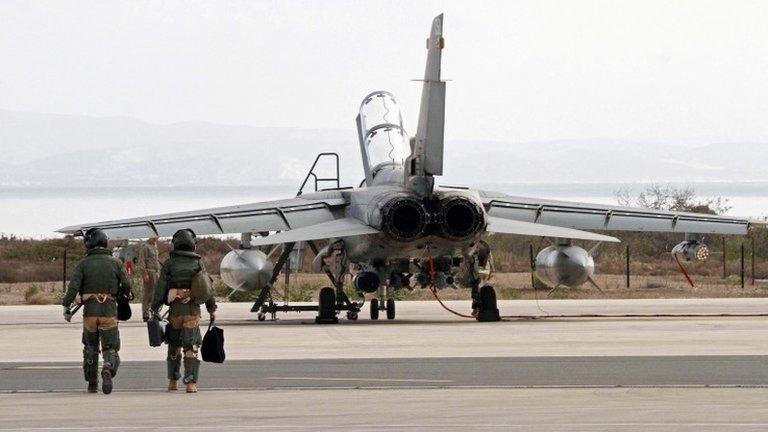Syria air strikes conducted by UK military pilots
- Published
- comments
Despite a vote in parliament two years against military action in Syria, British pilots have been involved in carrying out airstrikes against so-called Islamic State targets
UK pilots embedded with coalition allies' forces have been conducting air strikes over Syria against the Islamic State group, it has emerged.
This is despite UK MPs voting in 2013 against military action in Syria.
About 20 personnel, including three pilots, have been embedded with other coalition nations' forces, including the US and Canada, the BBC understands.
Defence Secretary Michael Fallon defended the exchange of troops, saying it was "standard operating practice".
However, there was criticism from Labour, UKIP and the SNP, and some within the Conservative party.
Tory MP John Baron said the personnel should be withdrawn as Parliament had "said no to military intervention".
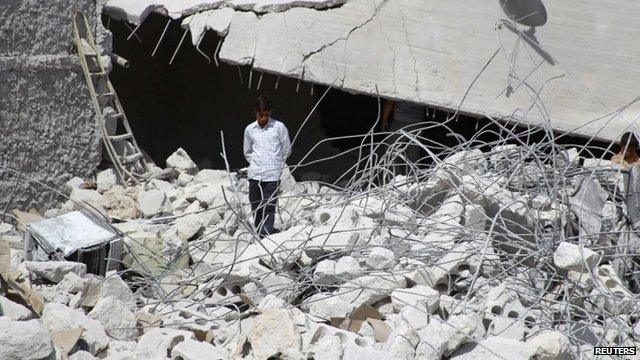
A man in Kfredrian, Idlib province, among buildings hit in what activists say were US air strikes
The MoD said personnel embedded with the US, French and Canadian armed forces had been authorised "to participate in coalition operations" and were under those forces' chain of command.
UK pilots are not currently taking part in the region, the MoD said, but ministers would have been aware of their recent role - and the prime minister's spokeswoman confirmed David Cameron had known.
Mr Fallon said it was "absolutely standard practice" to exchange personnel with allied forces, and had been "since the end of World War Two".
He said there was "no mystery about that", and "most people have known".

Analysis
Ross Hawkins, political correspondent
Why weren't we told?
That's the question troubling many MPs, not all of them on opposition benches.
They voted against British action in Syria two years ago. They were told their approval would be sought before any future air strikes in the country.
And yet news of Britons bombing Syria emerged not in the Commons but via a freedom of information request.
Few pilots were involved. They were under foreign command. None are flying the missions now.
But for a prime minister showing every sign of making plans for another vote on Syrian strikes this will have built no trust.
Ministers are highly likely to end up explaining themselves to the Commons, whether they want to or not.

"ISIS have to be defeated in both countries. We don't have at the moment parliamentary authority to carry out military airstrikes in Syria, but the Americans do and they've been doing that to keep all of us safe.
"When we're going to run British military strikes in Syria, of course we've said we'll go to Parliament for approval, but this is different."
'Insensitivity'
The MoD said the British pilots involved flew intelligence, surveillance, reconnaissance and strike missions against IS.
Only the US and Canada are operating in Syrian airspace, it said.
The information emerged following a Freedom of Information request submitted by the human rights group Reprieve.
Mr Baron, who is a member of the Foreign Affairs Committee, told the BBC the government should explain its position as it showed "insensitivity to Parliament's will".
He was referring to the 2013 vote when MPs voted against military action to deter the use of chemical weapons by President Bashar al-Assad's regime in Syria.
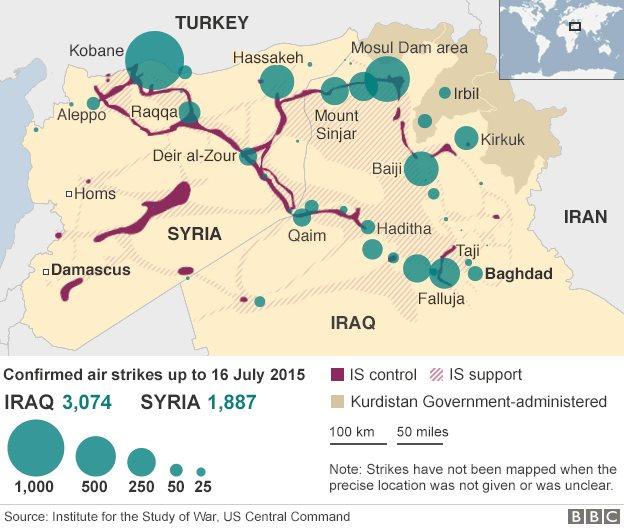
At the time, Prime Minister David Cameron said he would respect the defeat of the government motion by 285-272, and ruled out joining US-led strikes.
Mr Baron added: "Those troops or individuals should be withdrawn from the embedded programme whilst this vote holds sway, while it stills hold authority, until we vote again."
A Labour spokesperson said the party would ask the Ministry of Defence to make a statement in the Commons on Monday.
The programme to embed personnel with allies was "valuable" but the government "needs to be transparent about the role they play", he said.
Sir Michael Graydon, former chief of the air staff, said the exchange programme had been happening for "many decades", and the government was right "not to make a huge issue of it".
"There are very few people involved in this, there are none at the moment, the chances are there won't be for another two or three months."

30 August 2013: The government is defeated as MPs say no to military action against Syrian President Bashar al-Assad's government by 285-272
23 September 2014: The first US-led air strikes on Islamic State targets in Syria take place
26 September 2014: MPs back British participation in air strikes against Islamic State militants in Iraq, by 524 to 43
30 September 2014: The RAF carries out its first air strikes of the Iraq mission

Jennifer Gibson, staff attorney at Reprieve, said it was "alarming" that Parliament and the public had been "kept in the dark about this for so long" and she called for "an open and honest debate" about UK involvement in Iraq and Syria.
Alex Salmond MP, the SNP's foreign affairs spokesperson, said the government had been effectively overseeing a "bombing campaign by stealth".
"Past interventions and extensions of military action could at best be described as counter-productive, and at worst have helped to replenish the dark well from which terrorism springs," he said.
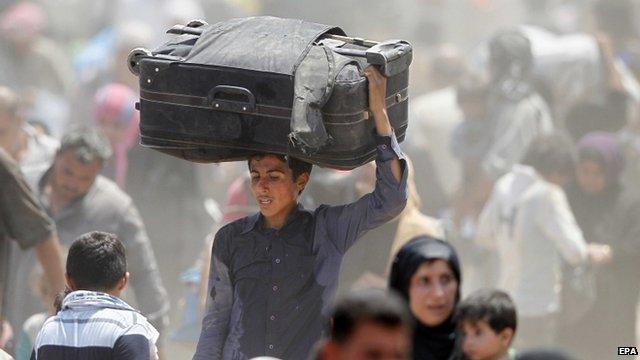
The UN estimates 11 million Syrians have been displaced by the conflict
Mike Hookem MEP, defence spokesman for UKIP, which campaigned in 2013 against UK air strikes in Syria, said the MoD was using a "smokescreen to deceive the British people after MPs voted against British involvement in Syria".
"Enough British soldiers have been sent to foreign wars," he said.
Crispin Blunt, Conservative MP and Foreign Affairs Committee chairman, said the 2013 vote on action in Syria was a "totally different decision" to the question of strikes on IS - and that that decision had not been undermined.
'Battle of Britain'
Defence Secretary Michael Fallon said on Thursday that the UK was engaged in a "new Battle of Britain" against IS, as he confirmed the deployment of a second RAF Rivet Joint spy plane to the region.
Professor Fawaz Gerges, professor of international relations at the London School of Economics, said he believed the British government had been preparing the public for greater involvement in Iraq and Syria, and he foresaw "more active engagement" in the next few months.
Professor Fawaz Gerges asks 'what happens if UK pilots are captured by IS?'
The US and five Arab allies launched the first strikes against IS militants in Syria in September last year.
Parliament then approved UK participation in the strikes in Iraq by 524 votes to 43.
Last month, Mr Fallon urged MPs to consider backing air strikes on IS in Syria and said the extremists needed to be targeted "at source".
Labour has indicated it would not oppose military action in Syria. Acting leader Harriet Harman has said the case for air strikes is now different to the situation in 2013, when Labour voted against UK military action in Syria.
Britain has already been carrying out surveillance and air-to-air refuelling operations over Syria.
- Published17 July 2015
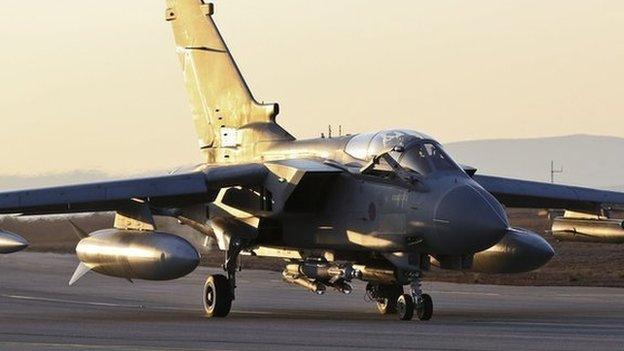
- Published12 July 2015
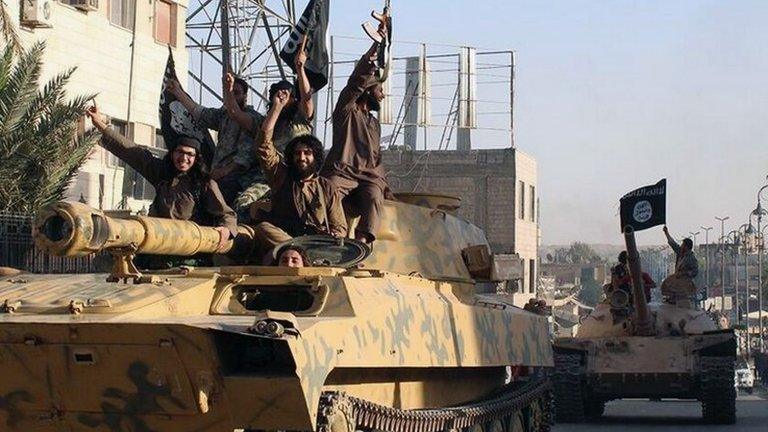
- Published3 July 2015
